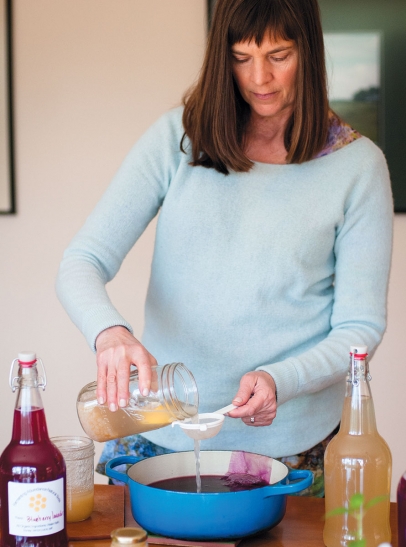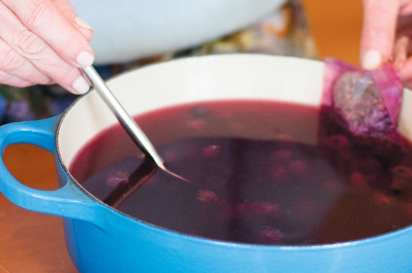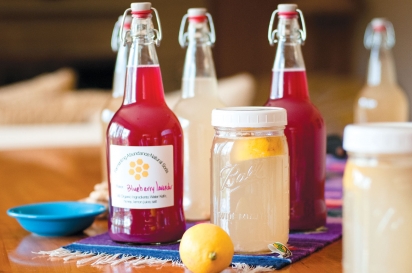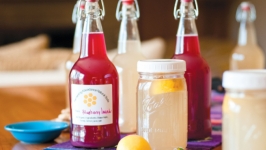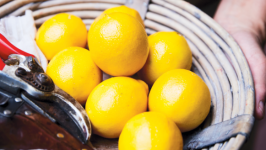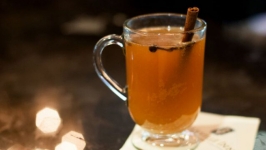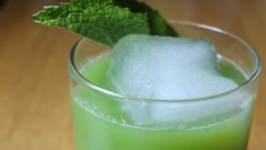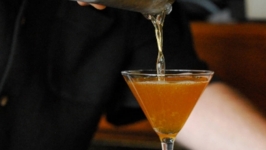Soda for the Soul
Soda used to be healthy.
Mineral springs were sources of healing for people, yet the bubbles in the water just a curiosity until a doctor discovered what made the water sparkle—carbon dioxide. Soda fountains were a fixture in pharmacies and people treated the refreshing drink like a tonic. One of the earliest sodas—root beer—was made with sarsaparilla and sassafras, two plants known to carry medicinal properties. Nature’s pure version of carbonated waters became the inspiration for what has more recently (and regrettably) become a fast-food staple.
In Clintonville, local educator, cook and writer Janine Harris Degitz makes a naturally fermented soda that harkens back to what people in the 1800s had the pleasure of savoring. It’s a simple drink, imbued with summer flavors like blueberry and lavender, stinging nettles and basil, ginger and lemon. And it’s made with water kefir, a culture that is used to ferment sugar-water. Her probiotic sodas glimmer with the sunny colors of the fruits and herbs she procures from local farmer friends like Kate Hodges of Foraged & Sown and Joseph Swain of Swainway Urban Farm.
“Fermentation was historically built on relationship,” Janine says. “Relationship to the Earth and soil, the growing seasons, relationship to the natural beneficial bacteria and yeasts that surround us and give life. It connected us to the people that grow our food and care for the land.” You can taste that tender connection Janine has to her community and how she preserves the moment in her sodas. She makes them for her family, along with miso, kimchi, sauerkraut, yogurt and other fermented staples. It was when her daughter—now a teenager—became seriously ill with a blood disease that Janine realized the importance of knowing where your food comes from and cultivating fermented foods that are alive with healthy bacteria for your family. After studying with the food writer, fermentation expert and DIY food activist, Sandor Katz, and researching different cultures on her own, Janine’s fermentation process has now mushroomed to become the core of her kitchen.
Fermentation has been around for a long time, longer than those healthy sodas. And fermented drinks, namely beer and wine, are some of the earliest examples. These staples date back as far as the Neolithic Age (7000 to 6600 BCE).
Today, it’s a certain American culinary fetishism that has revived fermentation and transformed the old friend into a trend. For a lot of chefs, home cooks and zealous health food experts, fermented foods are simply a part of the natural life cycle of our food and our gut.
“It diversifies the nutrients in our food through increasing the beneficial vitamins, enzymes and minerals available and enhancing the overall nutrient value of the food,” says Janine. “Fermentation integrates our relationship to our food in a unique and creative way through actively engaging us in the process of creating delicious, alive, health-giving foods.”
And these sodas are health-giving. They’re like kombucha without the caffeine or high sugar content of the fermented kombucha tea. They’re pure. One sip and I feel aglow with a vitality I can only attribute to the strength of the culture Janine has used and the nutrient-dense plants and fruits she has combined with it for flavor.
A fountain of youth, perhaps? Or simply something of old that my cells recognize as good for the marrow in my bones.
You be the judge.
Janine shares her recipe with us, encouraging us to take a moment to smell the bubbles and make a drink for ourselves and our family this summer that tastes like home and heals you all at the same time. She also teaches fermentation classes at The Seasoned Farmhouse and is offering a class on her natural sodas this summer.
Editor’s note: If you suffer from Leaky Gut Syndrome or Irritable Bowel Syndrome, or have a history of candida, check with your doctor before making your own fermented foods to make sure they’ll be suitable for your health.
Learn more about Janine Harris Degitz and her work at restorativeliving.org
What is Water Kefir, You Ask?
By Janine Harris Degitz
Water kefir is an amazing culture that is much like its more commonly recognized cousin, milk kefir, only it digests sucrose rather than lactose. This means that water kefir is perfect for fermenting sugar-water, transforming it into an effervescent, probiotic soda. Yes, a natural soda that is good for you. Both kefir cousins are made using a SCOBY (Symbiotic Colony of Bacteria and Yeast) commonly referred to as “grains” because of their granular structure. They are little, gelatinous clumps of microorganisms that can be strained out of your ferment and passed from batch to batch, perpetuating the line.
Naturally fermented water kefir is a traditional fermented drink that is easy to make. Fermentation time is short—just a couple of days. Kefir grains (like sourdough or kombucha) are a bit like a pet: they need to be fed on a regular basis to keep them active and alive. So while maintaining kefir grains may not be for everyone, these low-sugar, caffeine-free, cost-effective, probiotic-filled beverages are a refreshing and easy way to begin to add fermented foods into your diet.
Water kefir grains can be found from a local source through a friend, City Folks Farm Shop or through Cultures for Health, culturesforhealth.com.


